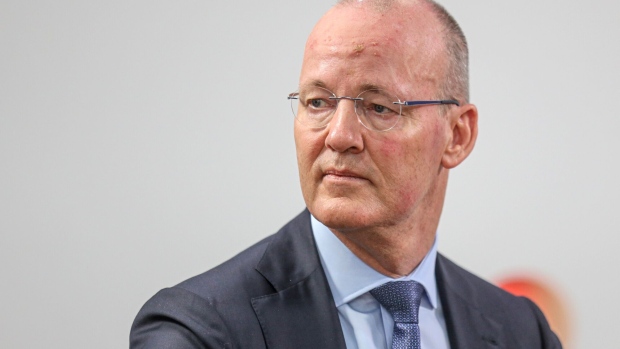Apr 18, 2024
ECB’s Knot Sees Oil Price Posing Lower Risks to Inflation
, Bloomberg News

(Bloomberg) -- A jump in energy prices would pose a less acute danger to inflation in Europe than the gyrations in commodities markets seen in recent years, according to European Central Bank Governing Council member Klaas Knot.
Describing current risks to consumer prices as “becoming more balanced,” the Dutch official told Bloomberg Television’s Lisa Abramowicz and Annmarie Hordern that inflation is subsiding toward 2% across the 20-nation euro area.
“Now, if we have an oil shock, it will be against a backdrop of general disinflation in all other factors,” he said Thursday in Washington. “The likelihood of significant second-round effects, I would argue, is smaller but it is clearly something to monitor.”
Knot and his colleagues are preparing to lower interest rates at the ECB’s next meeting in seven weeks, though many are cautious about moves beyond that in the wake of Iran’s attack on Israel at the weekend. Finland’s Olli Rehn, speaking later Thursday, again drew attention to geopolitical perils.
Knot said it would take a major jolt in the incoming data to shift his current position. Any “bumps” would have to be large enough to make him “fundamentally change my assessment of the ongoing disinflation process,” he said.
Bank of France Governor Francois Villeroy de Galhau told CNBC that June’s reduction in borrowing costs should go ahead, “barring a major surprise,” and that “When we say meeting by meeting, it can be at each following meeting — I don’t think, for example, that we should concentrate our rate cuts at quarterly meetings when we have a new forecast.”
His Lithuanian counterpart, Gediminas Simkus, was similarly minded, telling the TV station that only a “huge surprise” could derail the plan for June, and his baseline is for about three cuts this year.
Some reckon such comments jump the gun.
Latvia’s Martins Kazaks told CNBC that there’s “no rush” to loosen policy after the initial move, suggesting reductions be considered each quarter, as the ECB receives updated economic projections. That prudence was echoed by Bundesbank President Joachim Nagel.
“Discussions about what happens beyond June are premature,” he told reporters in Washington. “If you want to imagine that rates are lowered in June and what happens after, I’d describe as a careful glide path and at some point we’ll reach cruising altitude again.”
Delays by the Federal Reserve in monetary-policy loosening, meanwhile, are raising the prospect of prolonged divergence from the ECB and a weaker euro. Policymakers in Frankfurt can’t fully disregard developments in the US when charting their own path, Governing Council member Bostjan Vasle said in a separate interview.
Nagel, while acknowledging economic linkages, talked up Europe’s policy independence.
“There are some spillovers from the US and this is reflected in our macroeconomic forecasting,” he said. We’re not seperated from the US, but we’re doing monetary policy for the euro zone.”
Austria’s Robert Holzmann was less sure the ECB could pull “too far away,” saying that if the Fed doesn’t lower rates at all this year, “I hesitate to imagine us cutting three or four times.”
Knot had a similar view to Nagel.
“Obviously monetary policy always takes place in a global context,” Knot said. “But at the same time, we are not the 13th Federal District. We have our own monetary policy. We have our own set of outlooks.”
While the ECB doesn’t target a particular exchange rate, Knot said it’s “one input” that shapes officials’ thinking.
--With assistance from Craig Stirling, Kamil Kowalcze, William Horobin and Kati Pohjanpalo.
(Updates with ECB’s Rehn, Villeroy, Holzmann starting in fourth paragraph.)
©2024 Bloomberg L.P.






